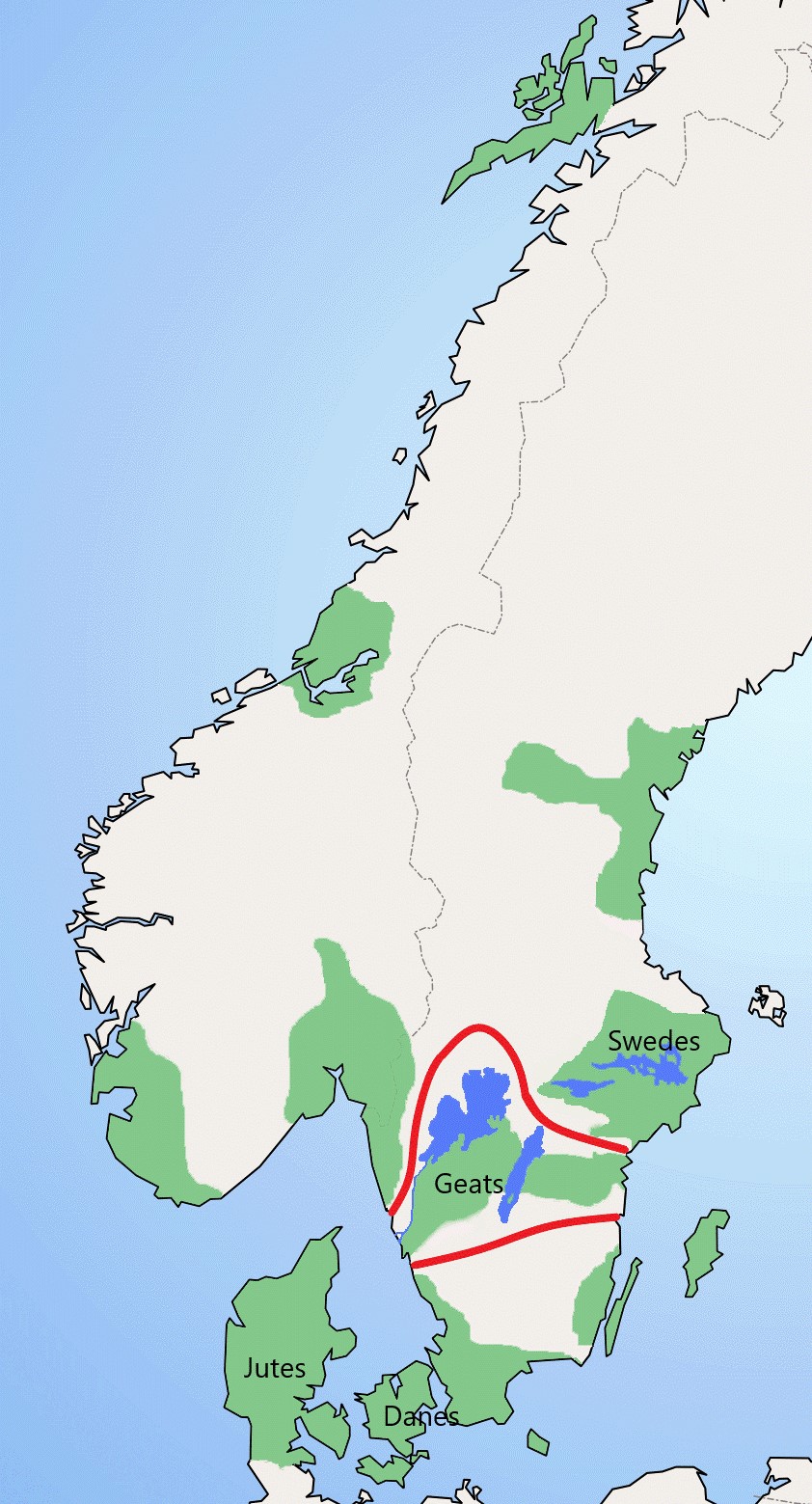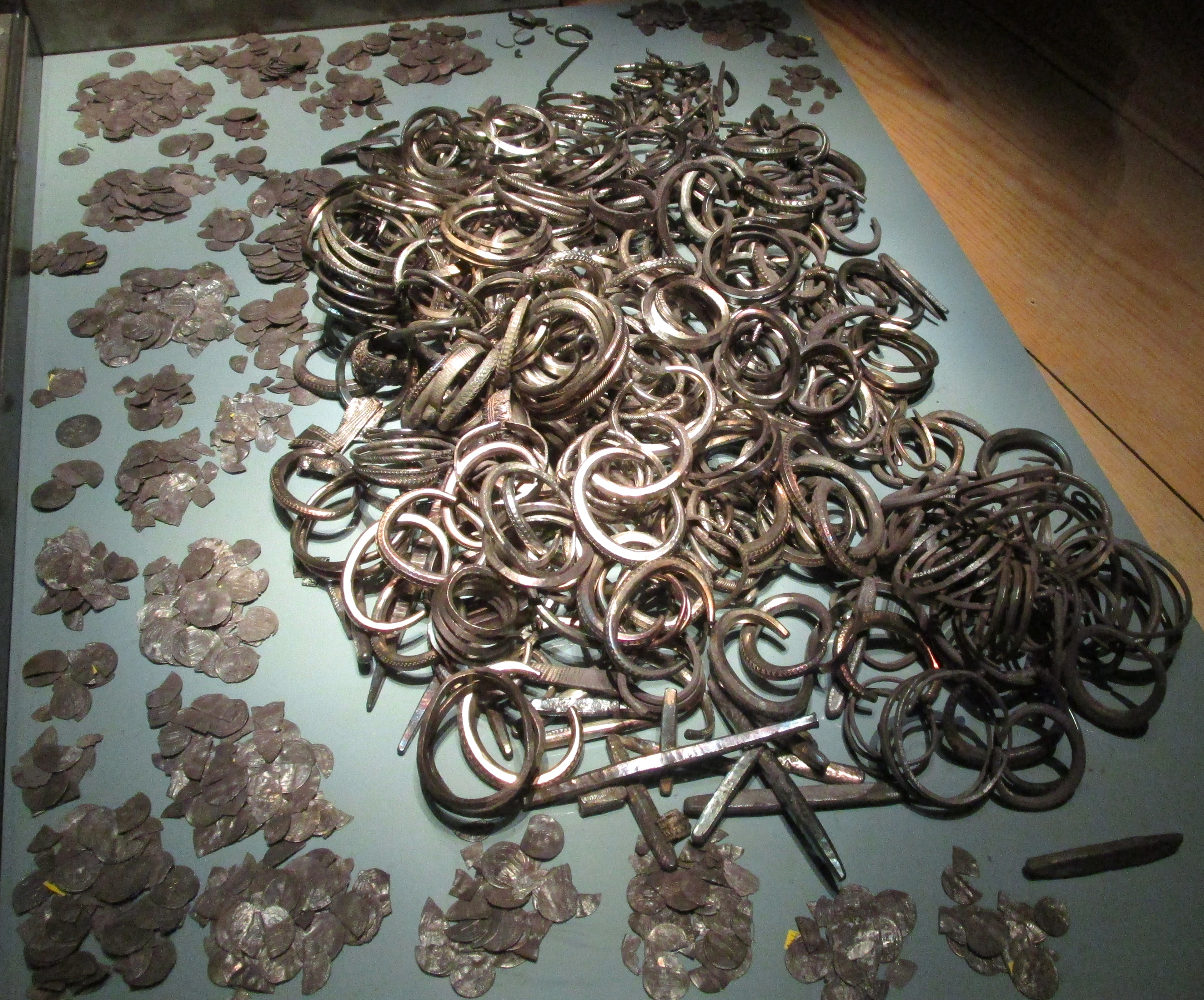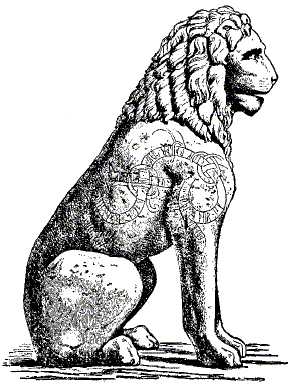|
Gutes
The Gutes ( Old West Norse: ''Gotar'', Old Gutnish: ''Gutar'') were a North Germanic tribe inhabiting the island of Gotland. The ethnonym is related to that of the ''Goths'' (''Gutans''), and both names were originally Proto-Germanic *''Gutaniz''. Their language is called Gutnish (''gutniska''). They are one of the progenitor groups of modern Swedes, along with historical Swedes and Geats. Name The name of the Gutes in Old West Norse is ''Gotar (adj. gotneskr)'', which is the same as that used for the Goths. Old Norse sources such as the sagas do not distinguish between the Goths and the Gutes. In accordance, the Old East Norse term for both Goths and Gutes seems to have been ''Gutar'' (adj. ''gutniskr''). Only the Goths and Gutes bear this name among all the Germanic tribes, even if '' Geat'' is closely related. The fact that the ethnonym is identical to ''Goth'' may be the reason why they are not mentioned as a special group until Jordanes' Getica, where they may be thos ... [...More Info...] [...Related Items...] OR: [Wikipedia] [Google] [Baidu] |
Geats
The Geats ( ; ; ; ), sometimes called ''Geats#Goths, Goths'', were a large North Germanic peoples, North Germanic tribe who inhabited ("land of the Geats") in modern southern Sweden from antiquity until the Late Middle Ages. They are one of the progenitor groups of modern Swedes, along with the tribes of Swedes (tribe), Swedes and Gutes. The name of the Geats also lives on in the Provinces of Sweden, Swedish provinces of and , the western and eastern lands of the Geats, and in many other toponyms. The Swedish dialects spoken in the areas that used to be inhabited by Geats form a distinct group, ''Götamål''. Etymology The etymology of the name ''Geat'' (Old English ', from a Proto-Germanic *''Gautaz'', plural *''Gautōz'') is similar to that of ''Goths'' and ''Gutes'' (*''Gutô'', plural *''Gutaniz''). The names derive from Indo-European ablaut, ablaut grades of the Proto-Germanic word *''geutaną'', meaning "to pour". They have the literal meaning "they who pour their se ... [...More Info...] [...Related Items...] OR: [Wikipedia] [Google] [Baidu] |
Geat
The Geats ( ; ; ; ), sometimes called ''Goths'', were a large North Germanic tribe who inhabited ("land of the Geats") in modern southern Sweden from antiquity until the Late Middle Ages. They are one of the progenitor groups of modern Swedes, along with the tribes of Swedes and Gutes. The name of the Geats also lives on in the Swedish provinces of and , the western and eastern lands of the Geats, and in many other toponyms. The Swedish dialects spoken in the areas that used to be inhabited by Geats form a distinct group, '' Götamål''. Etymology The etymology of the name ''Geat'' (Old English ', from a Proto-Germanic *''Gautaz'', plural *''Gautōz'') is similar to that of ''Goths'' and '' Gutes'' (*''Gutô'', plural *''Gutaniz''). The names derive from ablaut grades of the Proto-Germanic word *''geutaną'', meaning "to pour". They have the literal meaning "they who pour their seed". (For more information see Goths § Etymology.) The names could also allude to waterc ... [...More Info...] [...Related Items...] OR: [Wikipedia] [Google] [Baidu] |
Goths
The Goths were a Germanic people who played a major role in the fall of the Western Roman Empire and the emergence of medieval Europe. They were first reported by Graeco-Roman authors in the 3rd century AD, living north of the Danube in what is now Ukraine, Moldova, and Romania. From here they conducted raids into Roman territory, and large numbers of them joined the Roman military. These early Goths lived in the regions where archaeologists find the Chernyakhov culture, which flourished throughout this region during the 3rd and 4th centuries. In the late 4th century, the lands of the Goths in present-day Ukraine were overwhelmed by a significant westward movement of Alans and Huns from the east. Large numbers of Goths subsequently concentrated upon the Roman border at the Lower Danube, seeking refuge inside the Roman Empire. After they entered the Empire, violence broke out, and Goth-led forces inflicted a devastating defeat upon the Romans at the Battle of Adrianople in 378. Ro ... [...More Info...] [...Related Items...] OR: [Wikipedia] [Google] [Baidu] |
Gotland
Gotland (; ; ''Gutland'' in Gutnish), also historically spelled Gottland or Gothland (), is Sweden's largest island. It is also a Provinces of Sweden, province/Counties of Sweden, county (Swedish län), Municipalities of Sweden, municipality, and List of dioceses, deaneries and parishes of the Church of Sweden, diocese. The province includes the islands of Fårö and Gotska Sandön to the north, as well as the Karlsö Islands (Lilla Karlsö, Lilla and Stora Karlsö, Stora) to the west. The population is 61,023 (2024) of which about 23,600 live in Visby, the main town. Outside Visby, there are minor settlements and a mainly rural population. The island of Gotland and the other areas of the province of Gotland make up less than one percent of Sweden's total land area. The county formed by the archipelago is the second smallest by area and is the least populated in Sweden. In spite of the small size due to its narrow width, the driving distance between the furthermost points of the ... [...More Info...] [...Related Items...] OR: [Wikipedia] [Google] [Baidu] |
Awair Strabain
Awair Strabain or ''Avar Stråben'' ("straw-legs") was according to the Gutasaga a chieftain from Alva socken on Gotland and a wise and able man. The Gutasaga relates how many kinds attacked the island of Gotland in heathen times, but the gutes had always emerged victorious. Apparently the gutes were in conflict with the Swedes since several emissaries were sent to them to negotiate peace, but with no success. Finally Awair was sent as negotiator to the king of the Swedes. He reached an agreement that stipulated that Gotland would pay a certain tax to the land of the Swedes; "so that the Gutes would go of their own free will under the king of the Swedes so that they would freely and without risk travel to all places in the lands of the Swedes without paying tolls or other fees." According to a legend Awair Strabain came to the king of the Swedes and was granted an audience during a meal. The king asked "what news on the island of the Gutes?" to which Awair answered "Not much. ... [...More Info...] [...Related Items...] OR: [Wikipedia] [Google] [Baidu] |
North Germanic Peoples
North Germanic peoples, Nordic peoples and in a medieval context Norsemen, were a Germanic peoples, Germanic linguistic group originating from the Scandinavian Peninsula. They are identified by their cultural similarities, common ancestry and common use of the Proto-Norse language from around 200 AD, a language that around 800 AD became the Old Norse language, which in turn later became the North Germanic languages of today. The North Germanic peoples are thought to have emerged as a distinct people in what is now southern Sweden in the early centuries AD. Several North Germanic tribes are mentioned by Classical antiquity, classical writers in antiquity, in particular the Swedes (Germanic tribe), Swedes, Danes (Germanic tribe), Danes, Geats, Gutes and Rugii. During the subsequent Viking Age, seafaring North Germanic adventurers, commonly referred to as Vikings, raided and settled territories throughout Europe and beyond, founding several important political entities and exploring ... [...More Info...] [...Related Items...] OR: [Wikipedia] [Google] [Baidu] |
Gutasaga
Gutasaga (''Gutasagan'') is a saga regarding the history of Gotland before its Christianization. It was recorded in the 13th century and survives in only a single manuscript, the Codex Holm. B 64, dating to , kept at the National Library of Sweden in Stockholm together with the Gutalagen, Gutalag, the legal code of Gotland. It was written in the Old Gutnish language, a variety of Old Norse. Contents A local creation myth The saga begins with Gotland being discovered by a man named Þieluar (Swedish language, Swedish: Tjälvar, Gutnish: ''Tjelvar''). Gotland is under a spell and under water during the day and out of water only during the night, a spell that is broken by Þieluar lighting a fire on the island. Þieluar had a son named Hafþi (Swedish: Hafþi), who married a woman named Hwitastierna (Swedish: Vitastjärna; English: White-star). After Hafþi's and Hwitastierna's first night together, she has a dream about three snakes entwined in her bosom. Hafþi interprets her dream ... [...More Info...] [...Related Items...] OR: [Wikipedia] [Google] [Baidu] |
Swedes (tribe)
The Swedes (; Old Norse: ''svíar,'' ) were a North Germanic tribe who inhabited Svealand ("land of the Swedes") in central Sweden. Along with Geats and Gutes, they were one of the progenitor groups of modern Swedes. They had their tribal centre in Gamla Uppsala. The Roman historian Tacitus was the first to write about the tribe in his ''Germania'' from AD 98, referring to them as the ''Suiones''. Locally, they are possibly first mentioned by the Kylver Stone in the 4th century. Jordanes, in the 6th century, mentions ''Suehans'' and ''Suetidi''. These names likely derive from the Proto-Indo-European root * s(w)e, meaning "one's own". ''Beowulf'' mentions the Swedes around 1000 A.D. According to early sources such as the sagas, especially ''Heimskringla'', the Swedes were a powerful tribe whose kings claimed descendence from the god Freyr. During the Viking Age they constituted the basis of the Varangian subset, the Norsemen that travelled eastwards (see Rus' people). The scho ... [...More Info...] [...Related Items...] OR: [Wikipedia] [Google] [Baidu] |
Gothic Language
Gothic is an extinct language, extinct East Germanic languages, East Germanic language that was spoken by the Goths. It is known primarily from the ''Codex Argenteus'', a 6th-century copy of a 4th-century Bible translation, and is the only East Germanic language with a sizeable text corpus. All others, including Burgundian language (Germanic), Burgundian and Vandalic language, Vandalic, are known, if at all, only from proper names that survived in historical accounts, and from loanwords in other, mainly Romance languages, Romance, languages. As a Germanic language, Gothic is a part of the Indo-European languages, Indo-European language family. It is the earliest Germanic language that is attested in any sizable texts, but it lacks any modern descendants. The oldest documents in Gothic date back to the fourth century. The language was in decline by the mid-sixth century, partly because of the military defeat of the Goths at the hands of the Franks, the elimination of the Goths ... [...More Info...] [...Related Items...] OR: [Wikipedia] [Google] [Baidu] |
Gaut
is an early Germanic name, from a Proto-Germanic ''gautaz'', which represents a mythical ancestor or national god in the origin myth of the Geats. Etymology ''Gautaz'' may be connected to the name of the Swedish river Göta älv at the city of Gothenburg. The Geatish ethnonym *gautaz is related to the ethnonym of the Goths and of the Gutes (inhabitants of the island of Gotland), deriving from Proto-Germanic *gutô (cf. Gothic ''Gut-þiuda'', Old Norse ''gotar'' or ''gutar''). Tribal name Early inhabitants of present-day Götaland called themselves Geats (in Swedish language, Swedish ''Götar''), derived from *''Gautaz'' (plural *''Gautôz''), "to pour". Accounts The German chronicler Johannes Aventinus (ca. 1525) reported Gothus as one of 20 dukes who accompanied Tuisto into Europe, settling Gothaland as his personal fief, during the reign of Nimrod at Babel. The Swede Johannes Magnus around the same time as Aventinus, wrote that Gothus or Gethar, also known as Gogus or ... [...More Info...] [...Related Items...] OR: [Wikipedia] [Google] [Baidu] |
Old West Norse
Old Norse, also referred to as Old Nordic or Old Scandinavian, was a stage of development of North Germanic dialects before their final divergence into separate Nordic languages. Old Norse was spoken by inhabitants of Scandinavia and their overseas settlements and chronologically coincides with the Viking Age, the Christianization of Scandinavia, and the consolidation of Scandinavian kingdoms from about the 8th to the 15th centuries. The Proto-Norse language developed into Old Norse by the 8th century, and Old Norse began to develop into the modern North Germanic languages in the mid- to late 14th century, ending the language phase known as Old Norse. These dates, however, are not precise, since written Old Norse is found well into the 15th century. Old Norse was divided into three dialects: Old West Norse (Old West Nordic, often referred to as ''Old Norse''), Old East Norse (Old East Nordic), and Old Gutnish. Old West Norse and Old East Norse formed a dialect continuum ... [...More Info...] [...Related Items...] OR: [Wikipedia] [Google] [Baidu] |
Vagoth
The Vagoth (latinised ''Vagothae'') were a Germanic tribe mentioned by Jordanes as living in Scandza. They have been identified with the Geats of Vikbolandet and with the Gutes of Gotland, both in Sweden. They have been variously connected with the two places named by Jordanes, the (most vast lake) and the (river Vagi). Karl Zeuss thought Vagoth to be a misspelling of ''Vagos'' and connected them to the ''Vagar'' who later appeared in the Dovrefjell of Norway. Karl Müllenhoff, too, thought the term a corruption. He proposed *''Augothi'' or *''Avigothi'' (Norse *''Eygutar'') and placed them in Öland. According to Lithuanian linguist Kazimieras Būga, the Vagoths have given name to Germans and Germany in Lithuanian and Latvian languages ''(vokietis, vācietis'' and ''Vokietija, Vācija),'' and to Gotland in Finnish and Estonian ''(Vuojonmaa, Ojamaa “maa”'' = land). The Latvian linguist Konstantīns Karulis, known for his Dictionary of Latvian Etymology (1992), sees an ... [...More Info...] [...Related Items...] OR: [Wikipedia] [Google] [Baidu] |





